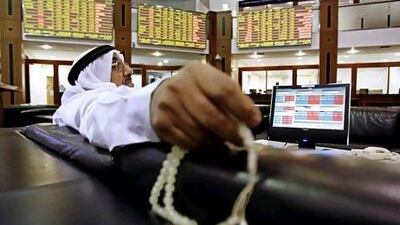With little vibrancy in the UAE's markets and trading levels depressed, efforts to revive the US economy and their effects on the price of oil are expected to be the driving force for local markets this week.
There was no post-Ramadan bounce in the UAE this year. The value of stocks traded on the Dubai Financial Market in the first week of business after Eid Al Fitr was less than one quarter of the value of trading during the same period last year, while the value of trading in Abu Dhabi was just 12.9 per cent of the value in the same period last year.
Other Gulf markets including Saudi Arabia and Qatar registered large increases in traded volume, even though stocks in those countries were battered by convulsions on world equity markets last month.
In contrast to previous rallies, Dubai stocks have risen 0.62 per cent to 1,438.71 and Abu Dhabi equities have advanced 0.41 per cent to 2,612.82 since markets reopened after Eid. Last year's gains were 3.5 per cent and 0.9 per cent, respectively.
UAE markets were experiencing a drought of economic signals to spur trading, said Yazan Abdeen, a fund manager at ING Investment Management.
"The major catalysts for this market would be showing further good and positive numbers in the banking sector for the third and fourth quarter," he said. "Unfortunately, I don't see any other catalysts for the time being."
Business confidence figures released by HSBC last week will add to the sense of gloom among traders in the UAE.
The purchasing managers' index (PMI) last month stood at 50.9, a 15-month low and an indication that confidence among business leaders is on the cusp of stagnation.
A PMI reading of more than 50 indicates optimism, while less than 50 indicates pessimism.
Is the prognosis for local companies universally dreary? Not entirely, says Credit Suisse, which is backing Drake & Scull International (DSI) in the UAE's construction sector.
Analysts said DSI's stock, currently trading at 87 fils, was likely to outperform, although they trimmed their target price to Dh1.26.
"We reiterate our preference for DSI over Arabtec on the back of strong backlog growth for DSI compared to stalled growth and declining profitability for Arabtec which we think is yet to be reflected in consensus numbers," Credit Suisse analysts said in a note.
Five-year bonds issued by Emirates Airline have also experienced significant demand, with yields falling 23 basis points since the start of the month.
However, policymakers' efforts to revitalise the world economy are expected to call the tune for local investors, after warnings from the IMF that signs of recovery are fading fast.
But in the US, a US$447 billion jobs plan announced by President Barack Obama on Thursday to cut payroll taxes and increase funding for state and local governments met with a frosty reception on Wall Street.
The S&P 500 Index fell 2.67 per cent to 1,154.23, while the dollar strengthened 1.76 per cent against the euro to $1.38.
Mr Abdeen said the effect on US consumer confidence would have profound repercussions for Gulf nations, many of which peg their currencies to the dollar and export large quantities of crude oil to the US.
Crude oil fell on Friday, with Brent futures down 1.55 per cent to $112.77 per barrel.
The Saudi Tadawul All-Share Index rose 0.22 per cent to 6138.06 yesterday.
The Organisation for Economic Co-operation and Development has also warned that Germany's economy may contract by 1.4 per cent in the fourth quarter, while Italy's GDP is expected to have fallen 0.1 per cent between the start of July and the end of this month.
The gloomy prospects for global growth have sparked cuts in price forecasts for crude oil. Economists at Capital Economics now predict Brent crude futures will fall to $85 by the end of next year.
"The factors that we had thought would undermine oil prices over the course of the year have been gradually falling into place, namely slower growth both in advanced and emerging economies, a reduction in Middle East risks, increased nervousness in global financial markets and a partial recovery in the dollar," the economics research company said in a note.

